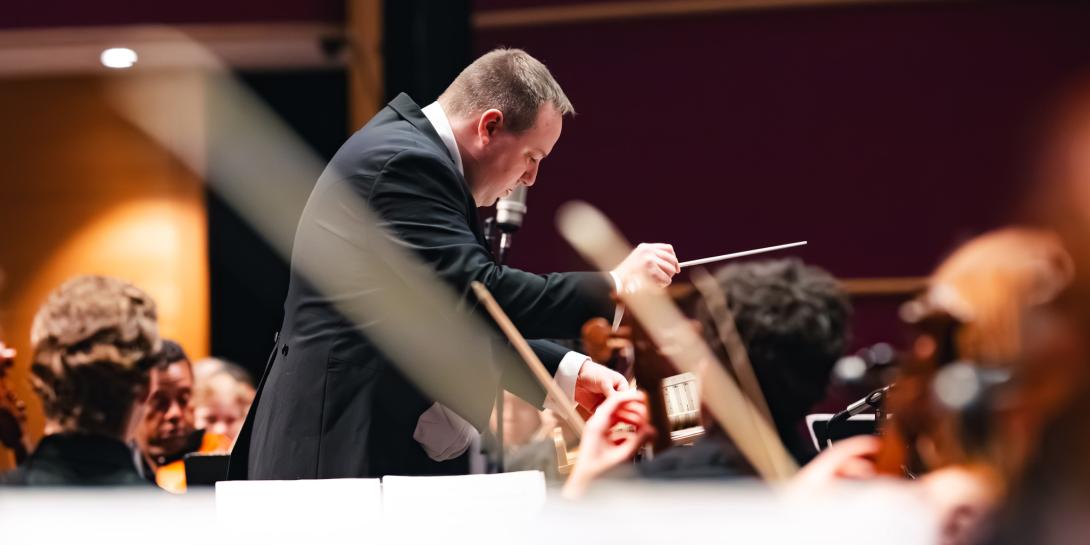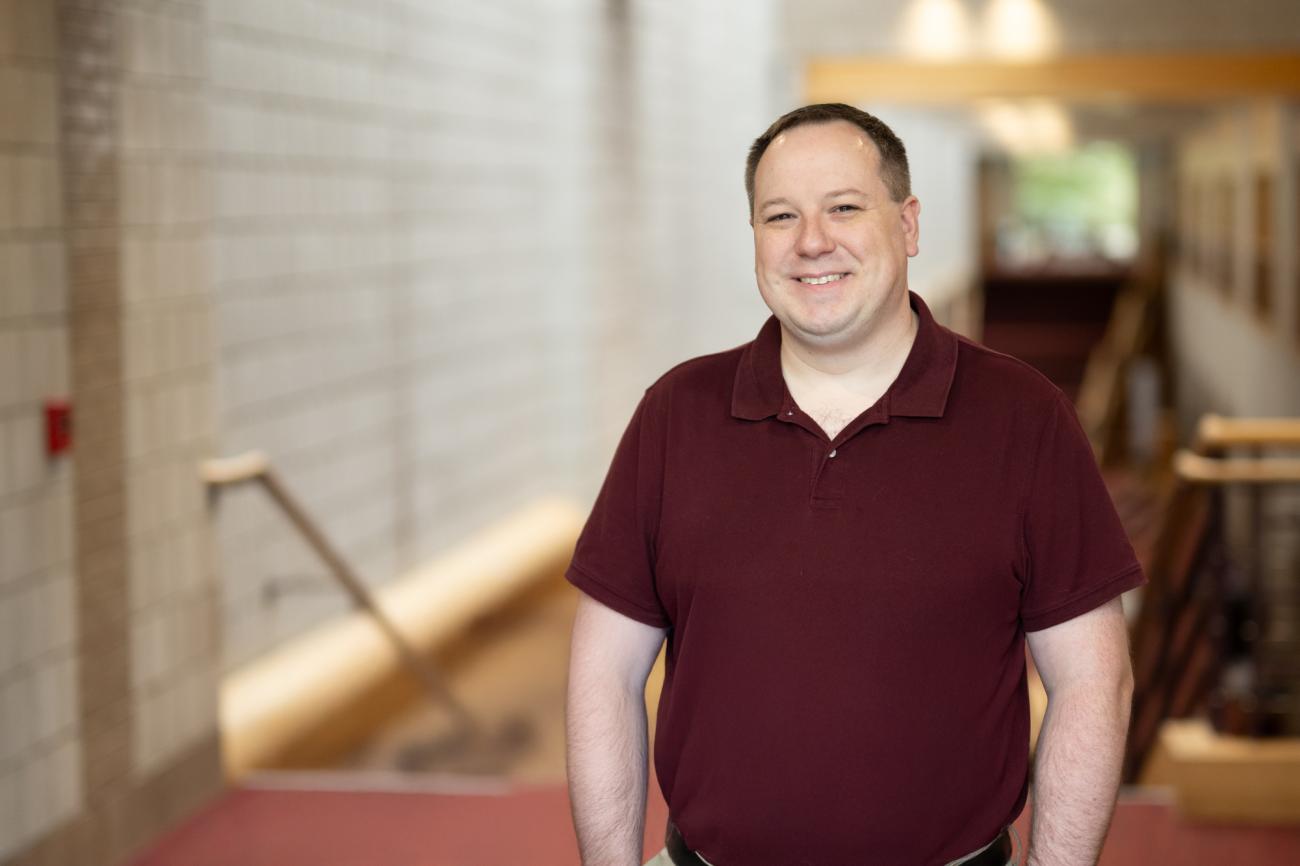Music for Imaginary Movies
Composer Kyle Wernke fulfills a decades-long dream project for Lehigh University Philharmonic.
For most composers, the period between childhood ambition and professional achievement spans years of refinement and compromise. For music professor Kyle Wernke, it's taken decades to finally realize a vision that first sparked when he was just 16 years old.
Wernke, who leads the Lehigh University Philharmonic, is composing an ambitious multi-movement orchestral work that reads like an ode to film music. Each movement represents a different part of a movie script, from main titles to plot twists, all unified by a single musical theme that weaves through various cinematic genres. The Philharmonic will premiere the work April 24, 2026, in Zoellner Arts Center’s Baker Hall. For Wernke, it represents both the fulfillment of a decades-old dream and a bridge between the classical tradition and the cinematic language that first inspired him to become a composer.
“Music for Imaginary Movies” draws inspiration from some of film’s finest scores. The composition doesn't follow a strict chronological path through film history. Rather, Wernke, assistant professor of music, draws inspiration from specific works that have moved him: the Western movement channels "High Noon" and "Silverado," while another movement takes cues from 1962’s "Mutiny on the Bounty." A superhero movement draws heavily from John Williams's Superman scores.
"It's less about chronology, more about these are the things that I like from the parts of these film scores. I'm going to try and do it myself and then hopefully I can get this all out of my system," he says with a laugh.
Currently working on the superhero movement, he's deep in analysis of Williams's techniques. "I'm really listening to how John Williams uses the trumpets here. How does he use the trombones here? Then what are the strings doing? And trying to say, okay, that's awesome. How can I do that and make it also me?"
Balancing Artistry and Accessibility
The composition presents unique challenges. While film composers like Williams can write demanding parts for professional union musicians, Wernke must balance his artistic vision with the capabilities of undergraduate students and community members.
"John Williams can write all these incredibly high trumpet parts and I'm thinking, ‘I can't do that.” he says. “So, I'm making my way through the piece, and thinking ‘Can they do it?’ And if the answer is no, they can't do it, then I think, how can I preserve this musical moment while also making it attainable for young musicians?”
Sometimes the fix is simple — dropping a note down an octave. Other times it requires reworking entire harmonic structures. The Western movement proved particularly challenging, as the genre typically features "high screeching trumpet parts," he adds.
Despite the technical challenges, Wernke believes his student musicians have an advantage — familiarity with the musical language. "For most of us, film music is our primary window into classical music or orchestral music," he noted. "Even as we get further and further into the 21st century, that still holds true."
This familiarity proved itself when the orchestra performed music from the 1988 film "Willow" by James Horner. Though none of the students had seen the niche fantasy film, "they totally figured out musically what's going on—the same kind of style as it's not that different from Tchaikovsky, which we were doing later in the semester, or Samuel Barber or Wagner."

Finding His Platform at Lehigh
Wernke's path to this project wasn't direct. Between his bachelor’s and master’s work at Butler University, he applied to the University of Southern California’s prestigious film scoring program but was denied entrance for lacking technological skills essential to modern film composition. A doctorate from the University of Hartford-Hartt School followed, but his passion for film music never faded.
"When I first got into music and being a composer, I wanted to be a film composer, and I was single-mindedly focused on that for a very long time,” he says. “When I was first starting to compose, I was trying to emulate my favorite film composers. And so that's where the idea for this piece came from. I thought, I don't know anyone who's making movies, so I'll just write music for my own movie. By the end of my master's degree, I had decided that film music was not going to be a career for me. I wanted to write music like the old masters from the thirties, forties, fifties, or John Williams, James Horner. And that's not the language that's being used anymore."
After seven years teaching in Missouri with orchestras that couldn't handle such an ambitious project, Wernke found the right ensemble when he arrived at Lehigh. "When I came here, it was very clear that yes, they can handle this idea."
The Lehigh University Philharmonic represents an unusual hybrid organization at Lehigh with education as its primary mission. The student ensemble has only a few music majors participating at any time — the rest major in other disciplines. Students receive one credit per semester despite substantial workload requirements. The orchestra also functions as a university club with officers and activities. Some students join solely as club members, enrolling fo thirties, forties, fiftier zero credit, after reaching maximum credit hours.
Community members are essential, filling out sections like strings and brass while providing continuity — some have participated for 10 years. This helps maintain sound quality despite 25 percent annual student turnover. Lehigh University faculty and staff from diverse disciplines including English, economics, engineering and chemistry perform alongside music department faculty and their students, creating unique hands-on training opportunities. Wernke wants to demonstrate that music "really does affect how we feel about the world around us. It's shaped by the art that we consume."
As the Philharmonic prepares for its April premiere, Wernke sees the project as a bridge between generations of listeners. By weaving cinematic influences into the concert hall, he hopes to remind audiences that music has always been about more than sound — it is a language that shapes the way we see and feel the world.

